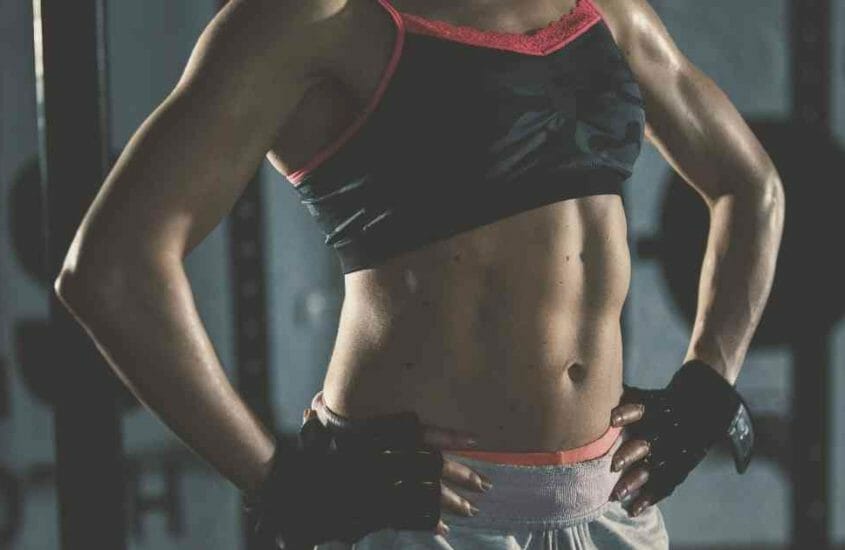You’re at the gym and you’ve hit your stride. You just got that extra curl in or did that last squat, and you feel a boost of confidence as you walk out the door. You’ve gotten bigger and stronger, but you’re probably wondering, “When should I stop bulking?”
Experts say that you should stop bulking when you’ve reached your ideal body fat percentage.
Keep reading to learn more about when to stop bulking, how many calories you should be consuming, and why it’s important to track your results.
What you will learn
The Ideal Time to Stop Bulking

This question can be answered differently depending on your fitness goals. The ideal time to stop bulking depends on what kind of physique you’re trying to build and where on the spectrum of muscle mass vs body that goal falls
For the Shredded Look
If you want to get shredded, you’ll likely want to stop bulking before you reach your genetic limit for muscle gain, as this will allow for higher fat loss when cutting.
For the Aesthetic Look
If you’re looking for a more aesthetic physique, then it’s possible that reaching this point will require significant time spent in a bulking phase and then some time spent cutting to reveal the results.
Ideal Body Fat Percentage
The ideal body fat percentage for you also depends on your goals.
If you’re trying to gain muscle, starting at a lower percentage is better. This way you have more room to gain muscle on a bulk before needing to cut again.
It’s also important to consider how much weight loss or gain your body can handle without causing irreparable harm. This will help prevent any health issues from occurring due to drastic changes in your diet or activity level.
Time to Build Muscle

Some people find it easier to gain muscle than others. One of the things that can affect how long it takes you to build muscle is your natural genetic predisposition.
Some people are genetically predisposed to gaining muscle faster, some are predisposed to gaining fat faster.
Others are predisposed to gaining muscle slower or losing fat slower. This means that if you’re one of those people whose body is genetically inclined to build muscle easily and quickly—or lose fat easily and quickly—you may be able to bulk for longer than someone who isn’t as lucky in the genetic lottery.
Fat Gain While Bulking:

The amount of fat you gain while bulking is extremely important.
When you bulk, you’re trying to gain muscle mass which also means gaining weight. The more muscle mass you gain, the more fat you’ll probably have to store as well.
If your body is getting too much energy from food and not enough from stored fat, then it will be harder for your body to make new muscle tissue. It’s easy to overdo this.
Balanced Bulking
- Gain roughly 1 pound per week during your bulking phase so that most of that extra weight is muscle tissue instead of fat.
- Track what percentage of calories come from protein and carbs versus fats throughout each day. According to Maria Fischer, you should aim for:
- 25% or less from protein sources (like meat or eggs).
- About 40% or more from carbohydrates like fruits/vegetables/bread/pasta (these are low-calorie sources).
- The rest should come from healthy fats like avocado oil.
| Macronutrients | While bulking | After bulking |
| Protein | 25% | 32% |
| Carbohydrates | 40-60% | 48% |
| Fats | 20-30% | 20% |
If you’re up one day and down the next, that’s a pretty good indicator that you should eat more calories than usual.
Complications While Bulking
You might have been told that if you’re not gaining weight, you’re not eating enough calories. But it’s more complicated than that.
- If you aren’t losing weight, you’re probably eating too many calories.
- And if your weight fluctuates from one day to the next, that’s a pretty good indicator that it’s time to eat more often (or eat more calories).
It also means there’s no point in being overly concerned with tracking your food intake down to the gram – you need an intuitive sense of what amount will keep your body happy and energetic while still providing enough fuel for muscle growth. You don’t want to be constantly hungry or feel like you have no energy at all.
Individual Circumstances While Bulking
There’s no hard and fast rule for when to stop bulking – it all depends on your circumstances.
Throughout this article, we’ve outlined many factors that can influence your decision:
- Your goals
- Your current body fat percentage
- Your genetic makeup
All of these factors are important to consider when deciding how long you should bulk for. It’s important to remember that there is no hard and fast rule for when to stop bulking – it depends on you.
General Guidelines for Bulking
That being said, there are a few general guidelines we can provide:
- If you’re looking to gain as much muscle mass as possible in the shortest amount of time while maintaining relatively low body fat levels, then three months might be a good place to start from.
- If gaining weight is not so much of an issue and you’re focusing more on getting stronger, then six to nine months would be a good timeframe for most people (depending on how quickly their metabolism adapts).
Body Fat Percentage
Is your body fat 15% or higher? You might want to stop bulking.
Why? Because you’re at risk of gaining weight in places that don’t look or feel good on you, such as your belly and hips. If your end goal is to get leaner after your bulk, you won’t want to let your body fat get too out of control.
So how can you tell if your body fat is too high?
If you can pinch more than an inch of fat on your stomach (or other trouble spots), then it’s time for a change in your approach to bulking.
You should also be aware of the fact that some people have a higher percentage of body fat than others—it depends on:
- Their genetics
- Their lifestyle choices (like whether or not they exercise regularly)
Importance of Bulking

Bulking is the process of gaining weight to increase muscle mass. It involves eating more calories than you need, which can lead to temporary weight gain.
While bulking has been criticized as unhealthy, it’s a safe and effective way to gain muscle if you’re doing it correctly.
It is the opposite of cutting, which is the process of losing weight while maintaining or increasing lean body mass. To bulk, you need to consume more calories than you burn each day. You can do this by eating more food or doing less cardio. By combining this with strength training, your body will store excess calories as fat and muscle.
Bulking is important because:
- It allows you to put on muscle mass without compromising strength or speed.
- When you bulk, you can eat more calories without gaining fat – meaning your body will be able to use those extra nutrients to build muscle instead of storing them as fat.
- This lets you maximize your workouts by building more muscle than usual while maintaining your strength levels.
Frequently Asked Questions
How do you know when to stop bulking?
When you start bulking, it’s important to monitor your body fat percentage. If you start to see that your body fat percentage is creeping up, it’s time to start cutting again.
When your body fat is above 15%, it might be time to start cutting.
How long should you bulk for?
Four to six months is a good length of time to bulk, but it depends on how you feel and how much weight you want to gain.
If you’re looking to gain a lot of weight, don’t worry about bulking for longer than six months. Just keep eating as much as you can.
If you’re more concerned with building muscle and want to avoid gaining a ton of weight, then four months should be plenty. The key is to focus on getting enough protein and calories in your diet while staying healthy and avoiding junk food.
How do bodybuilders start cutting after bulking?
When bodybuilders are bulking, they have to eat a lot of calories. But when they’re cutting, they have to cut those calories. How do they do it? There are several ways to cut calories after bulking.
A definite way to start cutting is to limit calories per day. This can be accomplished by eating smaller meals and choosing lower-calorie foods when you do eat. Another way is to increase your exercise routine. By exercising more often and for longer periods each day, you will burn more calories than usual.
Final Thoughts
If you’re wondering if you should stop bulking, then you’re probably close to your goal weight. Congratulations! Now that you know what kind of body fat percentage is best for your goals, it’s just a matter of tweaking your diet and exercise routine to get there.
You May Also Like: HOW TO BREAK THE WEIGHT LOSS PLATEAU?
